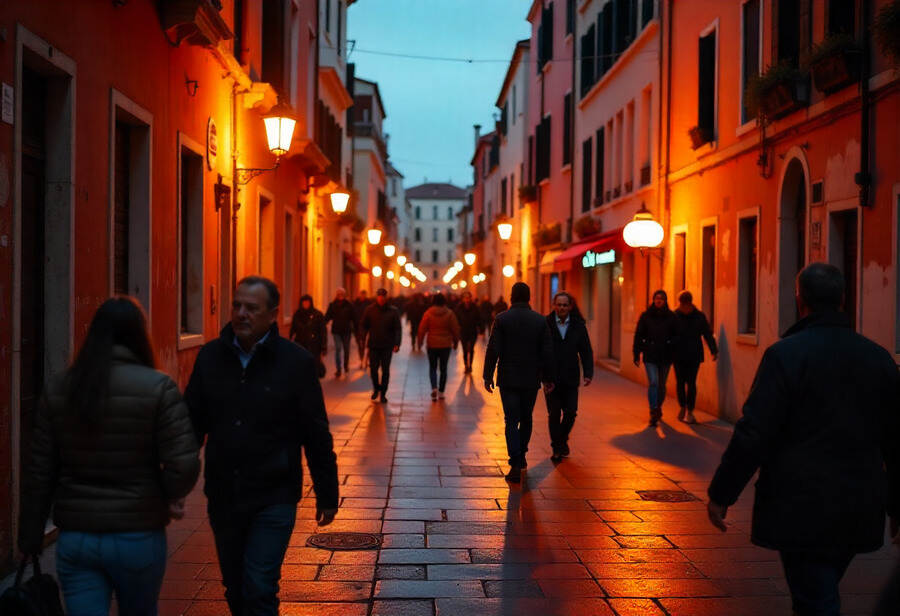Published on
August 23, 2025
Italy has intensified efforts to control tourist behavior in Venice with new strict rules and fines up to ₹50,000 for various inappropriate behaviors. The rules seek to preserve and protect the city’s historic sites, public safety, and the quality of life for locals, while also promoting responsible tourism.
Venice is famous for its canals and architecture, but has faced the problem of overtourism for many years. The new measures shows that the government is serious about attempting to protect the city.
Venice Has Fines for Bad Behavior
The city has kept an official record of infractions for which fines will be imposed, which means tourist misbehavior is no longer accepted. Major rules include:
Eating or drinking while seated on the ground next to statues: €100–€200 (₹10,164–₹20,329)Swimming, bathing or diving in the canals: €350 (₹35,575)Littering or dumping trash in public places: €350 (₹35,575)Strutting around in only bathing suits or shirtless: €250 (₹25,411)
The goal of these guidelines is to limit actions that might elope public order, the city’s upkeep, or disturb the public’s way of life. The authorities maintain that the intention is not to limit tourism, but to foster respectful tourism, meaning visitors should be considerate to the people of Venice.
The Changing Burden of Overtourism
Drawn to the city’s historic canals, artistic treasures, and architectural landmarks, Venice receives millions of visitors each year. While the city’s tourism industry is an important pillar of the economy, it is steadily suffering the consequences of overtourism. Streets and canals are congested, public spaces dirty, and residents cop months of daily life disruption.
The fines are part of a broader strategy to address these concerns. Venice aims to foster a safer, cleaner, and more enjoyable environment for tourists and locals alike by balancing rules with controlled visitor numbers instead of outright bans. This shift shows that the preservation of culture and urban heritage in the face of overtourism requires active management.
Europe is Increasingly Concerned with Sustainable Tourism
These initiatives in Venice are part of a wider European pattern of curtailing disruptive tourism. Albufeira in Portugal fines tourists €1,500 for wearing swimsuits away from the beach. Balearic Islands in Spain impose fines of €3,000 for public drinking. Such unprecedented fines indicate that European authorities are prioritizing residents and cultural preservation of countries over tourism.
These policies help to foster an appreciation of the fact that tourism management for a destination is not solely about controlling numbers, but actually about guiding visitor behavior. Through imposing fines, Venice joins other European destinations that seek to clearly lay down expectations and foster responsible tourism.
Preserving Residents’ Welfare and Heritage
The fines serve the additional purpose of protecting the local community. Unmanaged tourism can permanently damage historical landmarks, city infrastructure, and scenic views vital to the daily life of the locals. Venice, for instance, attempts to maintain its heritage and allow its people to live their lives seamlessly by discouraging swimming in the canals, littering, or wearing improper clothes in public spaces.
Authorities emphasize that these regulations are designed to implement a sustainable tourism model that safeguards the city’s character. Venice’s unique tourism environment is well preserved, and the regulations help offset the growing concern of disregarding the environment and foster a sense tourist awareness of their impact on the tourism site.
Promoting Sustainable Travel
The leading objective of Venice tourism is sustainable travel. Compliance with local laws and culture is a must, and the behavior of visitors has to be considerate. This kind of tourism is not only about avoiding sanctions. It is about enhancing the quality of life of locals, other travelers, and the city.
Actions are directed mostly to Venice’s delicate environment, complex canals, and ancient buildings, and thus call for responsible behavior. A set of instructions and fines designed to ensure that visitors are mindful of Venice’s culture and its architectural and historical gems.
Long-Term Implications for the Management of Tourism
While the concern that imposed fines might dissuade visitors to Venice, as experts believe, fine regulation, fine-restrictions, or managing visiter’s behavior, enforcement of guidelines can enhance visitor flow and long term sustainablity. Venice’s efforts to discourage the wrong type of tourism ensures that people who come ~ appreciate the true heritage. This method can aid in tourism as well as sustenance of the city in the long run.
In addition, the rules set by Venice can be a change for other cities that face over-tourism. Destination tourism can be economically helpful if controlled as it helps in retaining community life and cultural tourism.
Looking Forward: Venice and Sustainable Tourism
The enforcement of the fines however mention a proactive method to imposed challenges and fines set by modern tourism. Splitting fines to street vendors and visitors, while enabling other tourists to access city centers freely is an example of fine or high regulation tourism. Venice city authorities still need to observe the flows and results of the controls, modifying them in the case of a dangerous balance of tourism and community life.
Through a blend of fines and education, Venice is fostering a culture of mindful tourism. Tourists are being told that their actions, big or small, have a direct impact on the city and its people. The policies aim to make sure that Venice continues to be a top-of-the-list destination where the needs of the tourists and residents are managed and the historic beauty of the city is preserved for generations to come.
